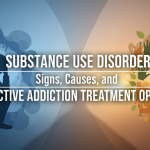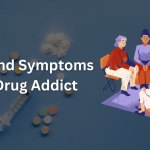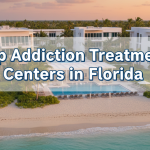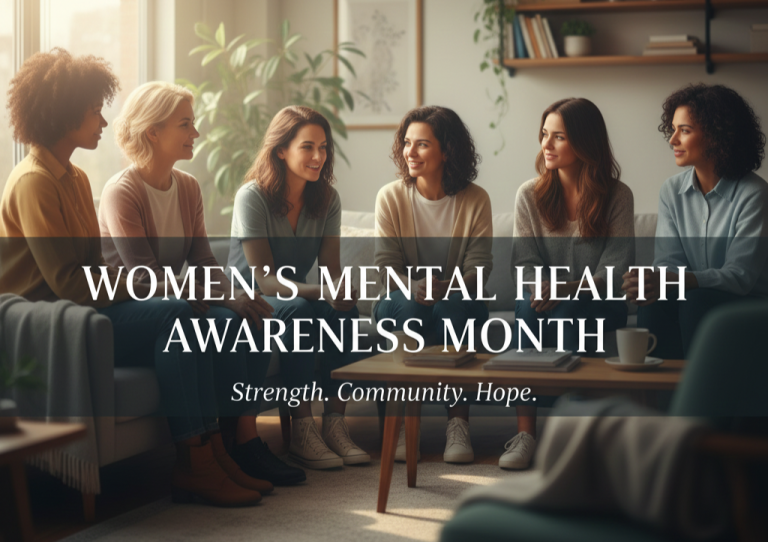If you’ve ever heard people talking about “wet brain,” they’re usually referring to Wernicke-Korsakoff’s Syndrome (WKS), a serious brain condition caused by a lack of vitamin B1, also called thiamine. This disorder is most commonly seen in people experiencing poor nutrition, eating disorders, or long-term alcohol use, along with a number of other health concerns.
Even though the phrase “wet brain” may still be used, it’s not an official medical term and can even be misleading or stigmatize those who are struggling. Wernicke-Korsakoff Syndrome is a real medical condition that needs urgent care, not judgment or blame.
In this guide, we’ll explore:
- What WKS is
- How alcohol can be connected to WKS
- The signs and symptoms of WKS
- Diagnosing and treating WKS
- Where to find help for alcohol addiction
If you or someone you love is living with a substance use disorder, you’re not alone. Solutions Healthcare provides discreet, comfortable, and comprehensive programs to help you heal. Call today to learn more about what your insurance will cover or to schedule an initial assessment with our staff.
What Is Wernicke-Korsakoff Syndrome (Wet Brain)?
Wernicke-Korsakoff’s Syndrome may also be referred to as wet brain, though the term is used less often today because it can be hurtful or misleading. WKS is a two-part neurological disorder linked to a lack of thiamine in the brain.
Your brain needs thiamine to turn food into energy and support normal brain function. When thiamine levels drop too low, the brain can’t work the way it’s supposed to. This causes brain cells to get damaged or die off, especially in areas linked to memory and coordination. Left untreated, low thiamine levels can lead to severe and even life-threatening damage.
WKS has two stages, known as:
- Wernicke’s encephalopathy: Short-term and potentially reversible
- Korsakoff’s psychosis: Chronic and often permanent
Not everyone with Wernicke’s encephalopathy will go on to develop Korsakoff’s, but many do, especially if they don’t receive treatment early on.
How Alcohol Use Is Connected to WKS
The primary cause of thiamine deficiency in the United States is chronic alcohol misuse. Here’s why:
- Alcohol affects nutrition: People who consume a lot of alcohol may experience poor nutrition as a result, meaning they’re not getting enough vitamins (like thiamine) in their diet.
- Alcohol blocks absorption: Even if someone eats a balanced diet and is generally healthy, alcohol can still stop the body from properly absorbing and using thiamine.
- Alcohol puts stress on the brain: Long-term alcohol use increases the brain’s need for thiamine, making deficiency more likely.
It’s estimated that up to 80% of people experiencing alcoholism are thiamine deficient, putting them at a greater risk for developing WKS.
Signs and Symptoms of WKS
The symptoms of Wernicke-Korsakoff Syndrome can develop slowly or appear suddenly. They tend to fall into two categories, depending on the stage of the illness.
Wernicke’s Encephalopathy
This stage is considered a medical emergency because it comes on quickly. It can also be reversed if treated right away. Common signs include:
- Confusion and disorientation
- Tremors
- Difficulty concentrating
- Trouble balancing while walking
- Problems with coordination
- Eye problems (double vision, drooping eyelids, blurred vision)
Not everyone shows all of these symptoms, and when they do appear, they may not be all at once. Doctors can sometimes miss the signs because they mistake it as intoxication or alcohol withdrawal.
Korsakoff’s Psychosis
If people with Wernicke’s don’t get the right treatment, it can lead to Korsakoff’s Psychosis, a more severe and long-lasting form of brain damage. Symptoms may include:
- Memory loss, especially with forming new ones
- Apathy, low motivation, or lack of emotion
- Difficulty with everyday tasks and responsibilities
- Irritability or aggression
- Poor decision-making
- Repetitive speech and behaviors
- Confabulation (making up stories or remembering things incorrectly)
Memory impairment from Korsakoff’s Psychosis can be permanent, which is why it’s so important to be able to recognize the signs and get help.
Diagnosing Wernicke-Korsakoff Syndrome
WKS can be hard to diagnose, especially in those who regularly drink alcohol. Since symptoms overlap with conditions like intoxication, withdrawal, or liver disease, doctors will rely on a variety of tools to make an accurate diagnosis. They may use:
- Physical exams and neurological testing
- Brain imaging (like an MRI) in rarer cases
- Blood tests to check thiamine levels
- Questions about alcohol use and medical history
Sometimes, doctors will start treatment with thiamine before making a full diagnosis. If the person’s symptoms start to improve, it can help confirm that WKS is the cause. Since untreated WKS can be deadly, early treatment is critical, even if the test results haven’t come in yet.
Treatment for WKS
The main treatment for Wernicke-Korsakoff Syndrome is high-dose thiamine, which can be given by injection or through an IV. The goal is to raise thiamine levels as quickly as possible and stop further damage. Most treatments also involve hydration and nutrition plans to prevent dehydration and fill the body with more vitamins and minerals.
While some people see improvements in a few days, others will need more extensive treatment and even long-term care to manage their symptoms. Inpatient programs may be appropriate for those in serious condition, needing detox, or experiencing severe memory loss or coordination issues. Once the individual is stable, an outpatient program may be recommended. Every treatment plan will depend on the individual and the specific symptoms and other conditions they’re presenting with.
Get Support for Alcohol Addiction
If you or a loved one is experiencing an addiction to alcohol, it’s never too late to reach out for support. Solutions Healthcare offers evidence-based treatment for substance use disorders that includes medical detox, psychiatric care, therapy, and more. Reach out at any time to learn more about how one of our programs could serve your needs and help you heal.
Resources:
- https://www.niaaa.nih.gov/publications/brochures-and-fact-sheets/wernicke-korsakoff-syndrome
- https://pubmed.ncbi.nlm.nih.gov/15303623/
- https://www.sciencedirect.com/topics/medicine-and-dentistry/wernickes-encephalopathy
- https://www.niaaa.nih.gov/publications/brochures-and-fact-sheets/wernicke-korsakoff-syndrome
- https://emedicine.medscape.com/article/288379-treatment?form=fpf#d1






















